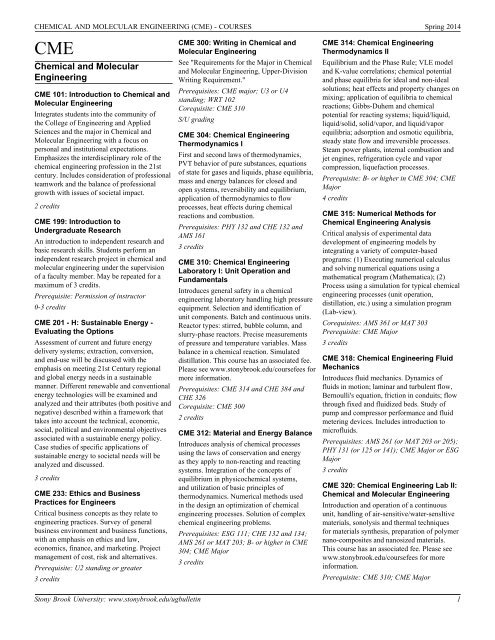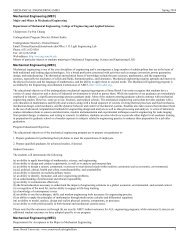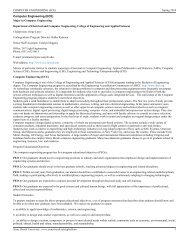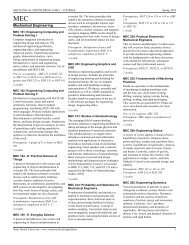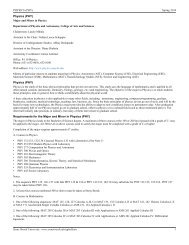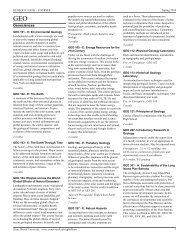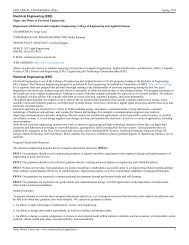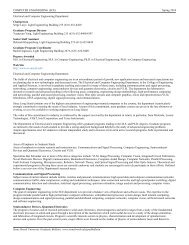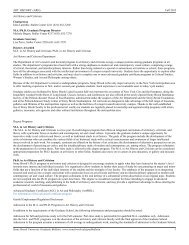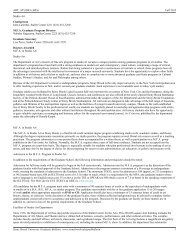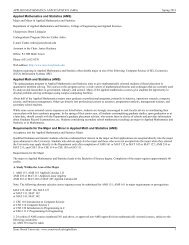Courses PDF - Stony Brook University
Courses PDF - Stony Brook University
Courses PDF - Stony Brook University
Create successful ePaper yourself
Turn your PDF publications into a flip-book with our unique Google optimized e-Paper software.
CHEMICAL AND MOLECULAR ENGINEERING (CME) - COURSES Spring 2014<br />
CME<br />
Chemical and Molecular<br />
Engineering<br />
CME 101: Introduction to Chemical and<br />
Molecular Engineering<br />
Integrates students into the community of<br />
the College of Engineering and Applied<br />
Sciences and the major in Chemical and<br />
Molecular Engineering with a focus on<br />
personal and institutional expectations.<br />
Emphasizes the interdisciplinary role of the<br />
chemical engineering profession in the 21st<br />
century. Includes consideration of professional<br />
teamwork and the balance of professional<br />
growth with issues of societal impact.<br />
2 credits<br />
CME 199: Introduction to<br />
Undergraduate Research<br />
An introduction to independent research and<br />
basic research skills. Students perform an<br />
independent research project in chemical and<br />
molecular engineering under the supervision<br />
of a faculty member. May be repeated for a<br />
maximum of 3 credits.<br />
Prerequisite: Permission of instructor<br />
0-3 credits<br />
CME 201 - H: Sustainable Energy -<br />
Evaluating the Options<br />
Assessment of current and future energy<br />
delivery systems; extraction, conversion,<br />
and end-use will be discussed with the<br />
emphasis on meeting 21st Century regional<br />
and global energy needs in a sustainable<br />
manner. Different renewable and conventional<br />
energy technologies will be examined and<br />
analyzed and their attributes (both positive and<br />
negative) described within a framework that<br />
takes into account the technical, economic,<br />
social, political and environmental objectives<br />
associated with a sustainable energy policy.<br />
Case studies of specific applications of<br />
sustainable energy to societal needs will be<br />
analyzed and discussed.<br />
3 credits<br />
CME 233: Ethics and Business<br />
Practices for Engineers<br />
Critical business concepts as they relate to<br />
engineering practices. Survey of general<br />
business environment and business functions,<br />
with an emphasis on ethics and law,<br />
economics, finance, and marketing. Project<br />
management of cost, risk and alternatives.<br />
Prerequisite: U2 standing or greater<br />
3 credits<br />
CME 300: Writing in Chemical and<br />
Molecular Engineering<br />
See "Requirements for the Major in Chemical<br />
and Molecular Engineering, Upper-Division<br />
Writing Requirement."<br />
Prerequisites: CME major; U3 or U4<br />
standing; WRT 102<br />
Corequisite: CME 310<br />
S/U grading<br />
CME 304: Chemical Engineering<br />
Thermodynamics I<br />
First and second laws of thermodynamics,<br />
PVT behavior of pure substances, equations<br />
of state for gases and liquids, phase equilibria,<br />
mass and energy balances for closed and<br />
open systems, reversibility and equilibrium,<br />
application of thermodynamics to flow<br />
processes, heat effects during chemical<br />
reactions and combustion.<br />
Prerequisites: PHY 132 and CHE 132 and<br />
AMS 161<br />
3 credits<br />
CME 310: Chemical Engineering<br />
Laboratory I: Unit Operation and<br />
Fundamentals<br />
Introduces general safety in a chemical<br />
engineering laboratory handling high pressure<br />
equipment. Selection and identification of<br />
unit components. Batch and continuous units.<br />
Reactor types: stirred, bubble column, and<br />
slurry-phase reactors. Precise measurements<br />
of pressure and temperature variables. Mass<br />
balance in a chemical reaction. Simulated<br />
distillation. This course has an associated fee.<br />
Please see www.stonybrook.edu/coursefees for<br />
more information.<br />
Prerequisites: CME 314 and CHE 384 and<br />
CHE 326<br />
Corequisite: CME 300<br />
2 credits<br />
CME 312: Material and Energy Balance<br />
Introduces analysis of chemical processes<br />
using the laws of conservation and energy<br />
as they apply to non-reacting and reacting<br />
systems. Integration of the concepts of<br />
equilibrium in physicochemical systems,<br />
and utilization of basic principles of<br />
thermodynamics. Numerical methods used<br />
in the design an optimization of chemical<br />
engineering processes. Solution of complex<br />
chemical engineering problems.<br />
Prerequisites: ESG 111; CHE 132 and 134;<br />
AMS 261 or MAT 203; B- or higher in CME<br />
304; CME Major<br />
3 credits<br />
CME 314: Chemical Engineering<br />
Thermodynamics II<br />
Equilibrium and the Phase Rule; VLE model<br />
and K-value correlations; chemical potential<br />
and phase equilibria for ideal and non-ideal<br />
solutions; heat effects and property changes on<br />
mixing; application of equilibria to chemical<br />
reactions; Gibbs-Duhem and chemical<br />
potential for reacting systems; liquid/liquid,<br />
liquid/solid, solid/vapor, and liquid/vapor<br />
equilibria; adsorption and osmotic equilibria,<br />
steady state flow and irreversible processes.<br />
Steam power plants, internal combustion and<br />
jet engines, refrigeration cycle and vapor<br />
compression, liquefaction processes.<br />
Prerequisite: B- or higher in CME 304; CME<br />
Major<br />
4 credits<br />
CME 315: Numerical Methods for<br />
Chemical Engineering Analysis<br />
Critical analysis of experimental data<br />
development of engineering models by<br />
integrating a variety of computer-based<br />
programs: (1) Executing numerical calculus<br />
and solving numerical equations using a<br />
mathematical program (Mathematica); (2)<br />
Process using a simulation for typical chemical<br />
engineering processes (unit operation,<br />
distillation, etc.) using a simulation program<br />
(Lab-view).<br />
Corequisites: AMS 361 or MAT 303<br />
Prerequisite: CME Major<br />
3 credits<br />
CME 318: Chemical Engineering Fluid<br />
Mechanics<br />
Introduces fluid mechanics. Dynamics of<br />
fluids in motion; laminar and turbulent flow,<br />
Bernoulli's equation, friction in conduits; flow<br />
through fixed and fluidized beds. Study of<br />
pump and compressor performance and fluid<br />
metering devices. Includes introduction to<br />
microfluids.<br />
Prerequisites: AMS 261 (or MAT 203 or 205);<br />
PHY 131 (or 125 or 141); CME Major or ESG<br />
Major<br />
3 credits<br />
CME 320: Chemical Engineering Lab II:<br />
Chemical and Molecular Engineering<br />
Introduction and operation of a continuous<br />
unit, handling of air-sensitive/water-sensItive<br />
materials, sonolysis and thermal techniques<br />
for materials synthesis, preparation of polymer<br />
nano-composites and nanosized materials.<br />
This course has an associated fee. Please see<br />
www.stonybrook.edu/coursefees for more<br />
information.<br />
Prerequisite: CME 310; CME Major<br />
<strong>Stony</strong> <strong>Brook</strong> <strong>University</strong>: www.stonybrook.edu/ugbulletin 1
CHEMICAL AND MOLECULAR ENGINEERING (CME) - COURSES Spring 2014<br />
2 credits<br />
CME 322: Chemical Engineering Heat<br />
and Mass Transfer<br />
Heat transfer by conduction, principles of heat<br />
flow in fluids with and without phase change,<br />
heat transfer by radiation, heat-exchange<br />
equipment. Principles and theory of diffusion,<br />
mass transfer between phases, distillation,<br />
leaching and extraction, fixed-bed membrane<br />
separation, crystallization.<br />
Prerequisite: B- or higher in CME 304; CME<br />
318; CME Major<br />
3 credits<br />
CME 323: Reaction Engineering and<br />
Chemical Kinetics<br />
Introduction to chemical reaction engineering<br />
and reactor design. Fundamentals of chemical<br />
kinetics for homogeneous and heterogeneous<br />
reactions, both catalyzed and uncatalyzed.<br />
Steady-state approximation. Methods<br />
of kinetic data collection, analysis and<br />
interpretation. Transport effects in solid and<br />
slurry-phase reactions. Batch and flow reactors<br />
including operations under non-ideal and<br />
non-isothermal conditions. Reactor design<br />
including bioreactors.<br />
Prerequisites: CME major; U3 standing; CME<br />
312 and 314<br />
3 credits<br />
CME 330: Principles of Engineering for<br />
Chemical Engineers<br />
This course focuses on the basic principles<br />
required for functioning in an engineering<br />
environment. Includes equilibrium and<br />
dynamics of rigid bodies, analysis of simple<br />
structures, conservation of energy, vectorial<br />
kinematics, collusions, general circuit analysis,<br />
fundamentals of AC power, CAD programs,<br />
introduction to market analysis, and discussion<br />
on ethics in engineering management.<br />
Prerequisites: U3 or U4 Standing, CME Major<br />
2 credits<br />
CME 355: Chemical Process Safety<br />
Fundamentals of chemical process safety:<br />
Industrial hygiene, toxicology, hazard<br />
identification, risk assessment, loss prevention,<br />
accident investigation.<br />
Prerequisites: PHY 132; PHY 134; CHE 322<br />
or CHE 326; CHE 327 or CHE 384<br />
3 credits<br />
CME 360: Nanomaterials and<br />
Applications<br />
Fundamentals of nanomaterials physics,<br />
chemistry and structure, nanostructure<br />
characterization and practical applications.<br />
Prerequisite: CME 304<br />
3 credits<br />
CME 369: Polymer Engineering<br />
An introductory survey of the physics,<br />
chemistry and engineering processes<br />
of polymers. Topics covered included<br />
classification of polymers, structures<br />
of polymers, morphology of polymers,<br />
thermodynamics of polymers, phase<br />
separation and phase transition of polymers,<br />
crystallization of polymers. Case studies<br />
of commercial polymer production and<br />
processing.<br />
Prerequisites: B- or better in CME 304 or ESG<br />
302; AMS 261 or MAT 203 or MAT 205<br />
3 credits<br />
CME 371: Biomedical Polymers<br />
This course focuses on the clinical<br />
performance of polymers and discusses<br />
the chemical, physical, mechanical and<br />
biological questions raised by the unique<br />
use of these materials within the human<br />
body. The chemistry and properties of key<br />
biomedical polymers will be studied and their<br />
biomedical applications will be discussed.<br />
The biomaterial's response to the various<br />
components of its biological environment<br />
will be addressed, followed by the response<br />
of the host to the presence of the implanted<br />
polymer. Special attention will be given to the<br />
interaction of the system with two fundamental<br />
phenomena: the Foreign Body Response<br />
and the Coagulation Cascade. Applications<br />
of bio-polymers to tissue engineering and<br />
the relevance of nanoscale phenomena are<br />
discussed.<br />
Prerequisite: CHE 321; CME 481; CME<br />
Major or permission of the instructor.<br />
3 credits<br />
CME 372: Colloids, Micelles and<br />
Emulsion Science<br />
This course addresses the fundamental science<br />
and chemistry of micro-emulsion and colloid<br />
formation, three-component phase diagrams,<br />
nanoscale structure and characterization<br />
techniques. Specific case studies and issues<br />
related to scale-up in food, cosmetics, and<br />
biomedical industries are presented.<br />
Prerequisite: CHE 132/134<br />
3 credits<br />
CME 401: Separation Technologies<br />
Fundamentals of separations. Introduction to<br />
standard classical and advanced separation<br />
methods and their relative merits and<br />
limitations. Distillation, crystallization,<br />
filtration, centrifugation, absorption and<br />
stripping methods. Includes fundamentals of<br />
chromatography.<br />
Prerequisites: CME major; U3 or U4<br />
standing; CME 323<br />
3 credits<br />
CME 410: Chemical Engineering<br />
Laboratory III: Instrumentation, Material<br />
Design and Characterization<br />
Students research a topic and together with<br />
the course instructor and undergraduate<br />
program director, select an advisor and thesis<br />
committee. The student, with the advisor,<br />
drafts a course of preliminary experiments and<br />
the student presents a written thesis proposal,<br />
with an oral defense, to his/her committee.<br />
This course has an associated fee. Please see<br />
www.stonybrook.edu/coursefees for more<br />
information.<br />
Prerequisite: CME 320<br />
2 credits<br />
CME 420: Chemical Engineering<br />
Laboratory IV: Senior Thesis<br />
Directed laboratory research. At the end of the<br />
junior year, in consultation with an advisor,<br />
the CME student will write a 1-2 page abstract<br />
describing proposed research. This abstract<br />
must be approved by the Undergraduate<br />
Program Committee (UPC). Through work<br />
accomplished in CME 420, the student will<br />
expand the research proposal into a senior<br />
thesis written in the format of a paper in a<br />
scientific journal. The student will defend<br />
his/her thesis in front of the UPC prior to<br />
the end of the senior year. After the defense,<br />
three copies of the finished thesis must be<br />
presented to the student's advisor at least<br />
21 days before the date of graduation. The<br />
advisor then submits the thesis for final<br />
approval to the other UPC members. This<br />
course has an associated fee. Please see<br />
www.stonybrook.edu/coursefees for more<br />
information.<br />
Prerequisite: CME 410<br />
2 credits<br />
CME 427: Molecular Modeling for<br />
Chemical Engineers<br />
Molecular modeling techniques and simulation<br />
of complex chemical processes. Use of Monte<br />
Carlo methods and Molecular Dynamics<br />
methods. Emphasis on the simulation and<br />
modeling of biopolymeric systems.<br />
Prerequisites: PHY 132; ESG 111; AMS 261<br />
or MAT 203; AMS 361 or MAT 303; B- or<br />
higher in CME 304; CME Major<br />
3 credits<br />
CME 440: Process Engineering and<br />
Design I<br />
<strong>Stony</strong> <strong>Brook</strong> <strong>University</strong>: www.stonybrook.edu/ugbulletin 2
CHEMICAL AND MOLECULAR ENGINEERING (CME) - COURSES Spring 2014<br />
Fundamentals of process control and its<br />
role in process design. Process synthesis<br />
and reactor design parameters. Process flow<br />
sheet, P&ID symbols. Incorporation of<br />
environmental and safety aspects into process<br />
design. Design project selection with multiple<br />
realistic constraints. Team assignments,<br />
final project title and industrial mentor<br />
assignments. Introduction to CHEMCAD.<br />
This course has an associated fee. Please see<br />
www.stonybrook.edu/coursefees for more<br />
information.<br />
Prerequisites: CME Major; U4 Standing;<br />
CME 320 and CME 315<br />
3 credits<br />
CME 441: Process Engineering and<br />
Design II<br />
Review of engineering design principles;<br />
engineering economics, economic evaluation,<br />
capital cost estimation; process optimization;<br />
profitability analysis for efficient and accurate<br />
process design. HAZOP analysis. Application<br />
of CHEMCAD in a commercial process.<br />
Final process flowsheet design preparation<br />
incorporating engineering standards. This<br />
course has an associated fee. Please see<br />
www.stonybrook.edu/coursefees for more<br />
information.<br />
Prerequisites: CME 401 and 440<br />
3 credits<br />
CME 470: Polymer Synthesis: Theory<br />
and Practice, Fundamentals, Methods,<br />
Experiments<br />
This course teaches general methods and<br />
processes for the synthesis, modification, and<br />
characterization of macromolecules. This<br />
includes general techniques for purification,<br />
preparation and storage of monomers; general<br />
synthetic methods such as bulk, solution, and<br />
heterogeneous polymerization; addition and<br />
condensation polymerization; methods of<br />
separation and analysis of polymers.<br />
Prerequisites: PHY 132, PHY 134, CHE 322<br />
3 credits<br />
CME 475: Undergraduate Teaching<br />
Practicum<br />
May be used as an open elective and repeated<br />
once. Students must have U4 standing as<br />
an undergraduate major within the college,<br />
a minimum gpa of 3.0 in all courses and a<br />
grade of 'B' or better in the course in which<br />
the student is to assist; permission of the<br />
department is required. May be repeated<br />
only once. May not be counted toward<br />
specialization requirements.<br />
Prerequisites: U4 standing, 3.0 gpa, grade of<br />
B or better in course which assisting<br />
3 credits<br />
CME 480: Cellular Biology for Chemical<br />
Engineers<br />
The course is intended to describe and<br />
introduce cellular and biological concepts<br />
and principles for chemical engineers. The<br />
course will provide details on the cellular<br />
processes, structures and regulations of the<br />
cellular homeostasis as response to internal<br />
and external changes and stimuli.<br />
Prerequisite: CME Major; U3 or U4 standing;<br />
or permission of the Undergraduate Program<br />
Director<br />
3 credits<br />
CME 481: Advanced Cell Biology for<br />
Chemical Engineers<br />
This course is intended to provide advanced<br />
topics in cellular behavior as a result of<br />
varying environmental cues. The course will<br />
focus on subjects associated with biological<br />
research related to various artificial materials<br />
and their influence on the cells and their<br />
interaction with the materials.<br />
Prerequisite: CME 480<br />
3 credits<br />
CME 488: Industrial Internship in<br />
Chemical Engineering<br />
Research project in an industrial setting under<br />
joint supervision of an industrial mentor<br />
and chemical engineering faculty. Project to<br />
cover some or all of the following chemical<br />
engineering principles of product synthesis:<br />
experiment design, data collection, data<br />
analysis, process simulations, and report<br />
writing related to an actual production<br />
facility. May be repeated up to a maximum<br />
of 12 credits. May not be counted toward<br />
specialization requirements.<br />
Prerequisites: B average in CME courses;<br />
permission of supervising faculty member<br />
0-12 credits<br />
CME 490: Preparation for the Chemical<br />
Engineering/Fundamentals of<br />
Engineering Examination<br />
Preparatory class that provides an overview of<br />
professional licensure testing procedures for<br />
the Fundamentals of Engineering Examination<br />
and includes the section specific to Chemical<br />
Engineering. This class reviews subject areas<br />
on the general section of the test as well as<br />
the profession-specific section dealing with<br />
chemical engineering.<br />
Prerequisite: CME Major<br />
1 credit, S/U grading<br />
CME 499: Research in Chemical<br />
Engineering<br />
Independent research project under the<br />
supervision of a chemical engineering or<br />
interdisciplinary faculty member. Project to<br />
cover some or all of the following chemical<br />
engineering principles: experiment design, data<br />
collection, date analysis, process simulations,<br />
and report writing. May be repeated but a<br />
maximum of 3 allowable total credits. May not<br />
be used for specialization requirements.<br />
Prerequisites: B average in CME courses;<br />
permission of supervising faculty member<br />
0-3 credits<br />
<strong>Stony</strong> <strong>Brook</strong> <strong>University</strong>: www.stonybrook.edu/ugbulletin 3


